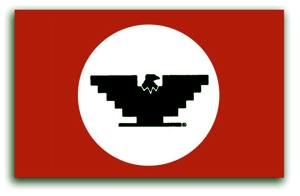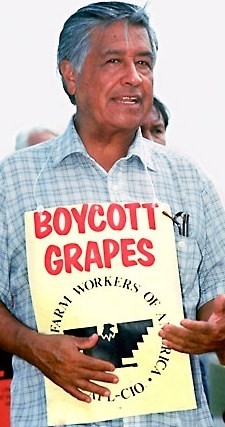 |
“Si se puede,” are the famous words of my hero. My hero is César Estrada Chávez. I chose him as my hero for many reasons. He made a difference, a difference no one will forget. He made many people proud. I may have many heroes but he is the one that makes me think of some things in a different way. There are many words that can describe him and how he felt about many situations going on.
César Chávez was born March 31, 1927. He was named after his grandfather, who escaped from slavery on a Mexican ranch and arrived in Arizona during the 1800’s. He is son of Librado Chávez and Juana Estrada. César was the second of their six children. His father worked on the family ranch and was owner of a store. César and his family lived in an apartment above the store.
César Chávez lived near Yuma, Arizona. He began school when he was only seven years old. It was pretty difficult because his family only spoke Spanish. Later he and his family had to move to California. His family became part of a migrant community, which meant they traveled from farm to farm to pick fruits and vegetables. They lived in many migrant camps and were forced to sleep in their car. Once he finished the 8th grade, he quit school and worked full time in the vineyards. In 1944 he joined the navy and served in War World II.
 |
César Chávez was a Mexican American farm worker, labor leader, and a civil rights activist. He worked in fields, but began to fight for change. In 1952 César became part of a group called the Community Service Organization (CSO). This group began urging Mexican Americans to register and vote. César Chávez became general director of the CSO in 1958. In 1962 Chávez left the CSO to form his own organization, which is called the National Farm Workers Association (NFWA). César Chávez took part in his first strike to protest low wages and poor working conditions. He had also boycotted buying grapes. In 1962 César asked his cousin to design a flag. César wanted an Aztec eagle on the flag, but his cousin could not make an eagle that he liked. The symbol of the eagle would give courage to the farm workers. The black eagle signifies the bad situation of the farm worker. The Aztec eagle is a historic symbol for the people of Mexico. The UFW added the Aztec eagle into its design in order to show the connection the union had to migrant workers of Mexican-American descent. The white circle signified hope and aspirations. The red background stood for the hard work and sacrifice that the union members would have to give. In 1965 César and the other strikers took a pledge on non-violence and César made a 25-day fast in 1968. During the 1980’s he led a boycott to protest the use of toxic pesticides on grapes. Like other UFW (United Farm Workers) he received subsistence pay that didn’t top $5,000 a year. In 1991, César Chávez received the Aguila Azteca (The Aztec Eagle), which is Mexico’s highest award presented to people of Mexican heritage who have made contributions outside of Mexico. On August 8, 1994, César Chávez became the second Mexican American to receive the Presidential Medal of Freedom, that is the highest civilian honor in the United States.
 |
| (http://rogerhollander.files.wordpress.com/2009/03/cesar-chavez.jpg) |
I chose César Chávez as my hero because he really made a difference in life. He helped many Mexican Americans fight for their rights. He stood up for himself and other Mexican Americans. He might have not gotten many rights, but he gave his opinion and what he thought was unfair to farm workers. César Chávez’s hard work and fighting for his right made me think that I should do the same. I should always stand up for myself and fight for my rights! I will always have his words in my head “SI SE PUEDE!”
Page created on 11/14/2009 12:00:00 AM
Last edited 11/14/2009 12:00:00 AM
